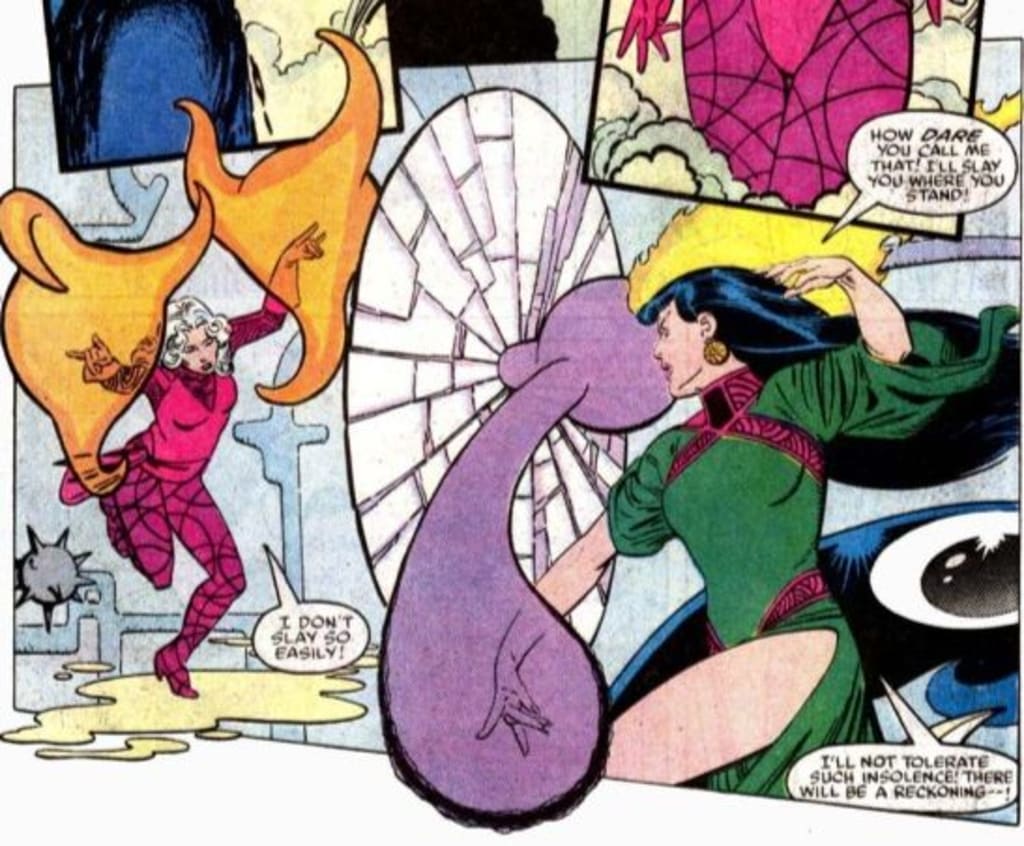When Clea Ruled: The Neglected Love of Dr. Strange
The Forgotten and Undying Ones, Part Two

Roger Stern and Peter B. Gillis defined Dr. Strange in the 80s, and Stern was especially noteworthy in chronicling Clea’s rise to power in the Dark Dimension, peaking with Clea’s defeat of her mother, Umar the Unrelenting, in Dr. Strange Vol. 2, number 73. Despite some recent depictions of Dr. Strange as a Tony Stark-like ladies man (and despite some superficial similarities, he is definitely not Tony Stark) Doc maintained, for several decades, a monogamous relationship with Clea who even became his wife (by cosmic common law, whatever that means) and may still technically be married to him though the status of this former Dark Dimension queen remains in limbo (the Dark Dimension and Limbo are completely different dimensions in the Marvel Universe, but the limbo I’m referring to here is called “Writers not caring as much as I do about Clea”). She remains one of the most egregiously neglected characters in Marvel history as she has remained a dangling cliffhanger since the late 90s, yet in this peak moment of defeating her mother, Clea fully manifested as one of the greatest female counterparts to a superhero title character in all of comics, becoming stronger than her husband who is himself one of Marvel's strongest superheroes.
In fact, in ruling the Dark Dimension, as Stern and Gillis and a few later writers depict until the cancellation of Vol. 3, Clea on several occasions defeats or holds off rebellions by two of Doc's most powerful villains (her uncle, Dormammu, and her mother, Umar), both of whom are several thousand times more powerful than Doc and whom Doc rarely ever technically defeats. They are both godlike Faltinian entities making Clea essentially half-goddess. This is perhaps the reason later writers aren’t quite clear how to handle her. Dormammu and Umar are energy beings who manifested in the Dark Dimension and became godlike beings deriving power from worship, fear, belief, etc. (a concept Clea cleverly uses to defeat her mother). It’s easier to conceive of such beings as purely evil (and Clea is a stronger character for resisting this potentially evil half of herself), but Umar, in her curiosity about humanity (and Dark Dimension citizens are essentially human) makes herself human and breeds with Orini, Clea’s dad, but instantly regrets it (poor Orini) and goes back to her evil ways though she can no longer convert back to her flaming form. Dormammu manipulates this weakness to exile her and take sole power for himself. That makes for some compelling family drama, and the Dark Dimension has been a continuous Game of Thrones-like melodrama of succession, with Dormammu, Umar, and Clea constantly battling, bargaining, and betraying one another for ultimate rule. In number 73, Umar has taken over for an exiled Dormammu, and Clea defeats her mother to rule for the first time by manipulating Umar’s greatest weakness: imposter syndrome. She shows the citizens of the Dark Dimension that Umar is weaker than she appears, and their faltering belief in her makes her exponentially weaker as a result. Dr. Strange merely runs interference for much of this storyline, fighting rampaging Midless Ones, so Clea gets all the credit. Clea maintains power off and on for about a decade longer, except for brief periods (e.g. Umar and Mordo ruling together briefly in the early 90s). In Clea’s last appearance before the cancellation of volume 3, she is holding off another Dormammu rebellion that seems to be going badly, and then when Dormammu appears later (in the “Flight of Bones” miniseries from 1999), his rule of the Dark Dimension seems to be taken for granted with no mention of Clea’s fate.
Part of what makes Clea’s ascendency in number 73 so glorious is her steep trajectory from damsel in distress in the 60s to apprentice throughout the 70s to queen in the 80s—arguably, there is no more progressive evolution of a female character in Marvel. Her trajectory is roughly similar to Sue Storm’s: from the weakest link in the Fantastic Four, constantly belittled by her soon-to-be husband, to an independent woman and the strongest member of her team. Marvel has touted its recent progressive depiction of female characters with Captain Marvel, etc., yet Sue Storm and Clea have both disappeared from the universe. At least Sue Storm got a fairly definitive storyline exit in Secret Wars while Clea has merely been forgotten—to be replaced by weaker characters like Zelma Stanton in the recent Jason Aaron run and Christine Palmer in the movie, both perfectly fine characters, strong enough in their own right, but in terms of intellect and pure power, they remain Doc’s inferiors, functioning merely as normalizing ride along characters to contrast extra-dimensional psychedelia inherent to the narrative. This approach makes the stories supposedly more relatable and accessible for casual fans, but the unfortunate consequence is the obfuscation of Clea whose character transcends functional contrast or introductory perspective. She has her own long-developing character arc which merely overlaps Doc’s various arcs. She has her own distinct personality beyond the “Oh, Stephen, you are so strange” personality other writers seem to think is necessary.
That's why Dr. Strange vol. 2, number 73, is one of my favorites in the magnificent mid-80s run of Roger Stern: it demonstrates why forgetting Clea does a massive disservice to both Clea and Dr. Strange. Doc’s lack of significant presence in the defeat of Umar doesn’t make him seem weaker—the Mindless Ones are a threat that even scared Dormammu in their first appearance (despite the Spider-Man cartoon depicting them as crumbly rock monsters)—but the independent triumph of his greatest love rounds the whole cast in a way ride along characters can’t. In Clea’s last battle against Dormammu, she pleads for Doc to come to the Dark Dimension to help her, but Doc is at his lowest power (during the “Strangers Among Us” storyline) and simply can’t. Clea’s determination to continue to fight alone, and the couple’s inability to help one another heightens the moral complexity and tragic condition of both characters. Yet when Doc is back to full power and experiences his next romantic flirtation with Night Nurse in The Oath miniseries, the type of flirtation he’d normally resist in dedication to Clea, this time he doesn’t even consider his maybe-dead wife. He just jumps into bed with Night Nurse (one of the many things that bothers me about The Oath) merely because Brian K. Vaughn didn’t care what happened to Clea. Aaron also gives Doc a total wife-neglecting promiscuity for no clear reason, and no editor took the time to say, “Dr. Strange and Tony Stark are two different characters” or “Let’s take a panel or two to resolve the fate of Clea who used to be the second most significant character in this title.” These editorial oversights make Doc seem like a horrendous prick (more so than normal) by totally neglecting one of his most significant positive characteristics: his loyalty.
If giving Doc a normal human female counterpart like the Night Nurse or Zelma or Christine helps the casual fan accept him so we get a volume 4 or multiple movie sequels, I’m totally okay with that, but as a hardcore fan, I think Doc needs a half-Faltinian sorcerer queen as his perfect match.
About the Creator
F. Simon Grant
I'm a fiction writer and a collage artist.






Comments
There are no comments for this story
Be the first to respond and start the conversation.